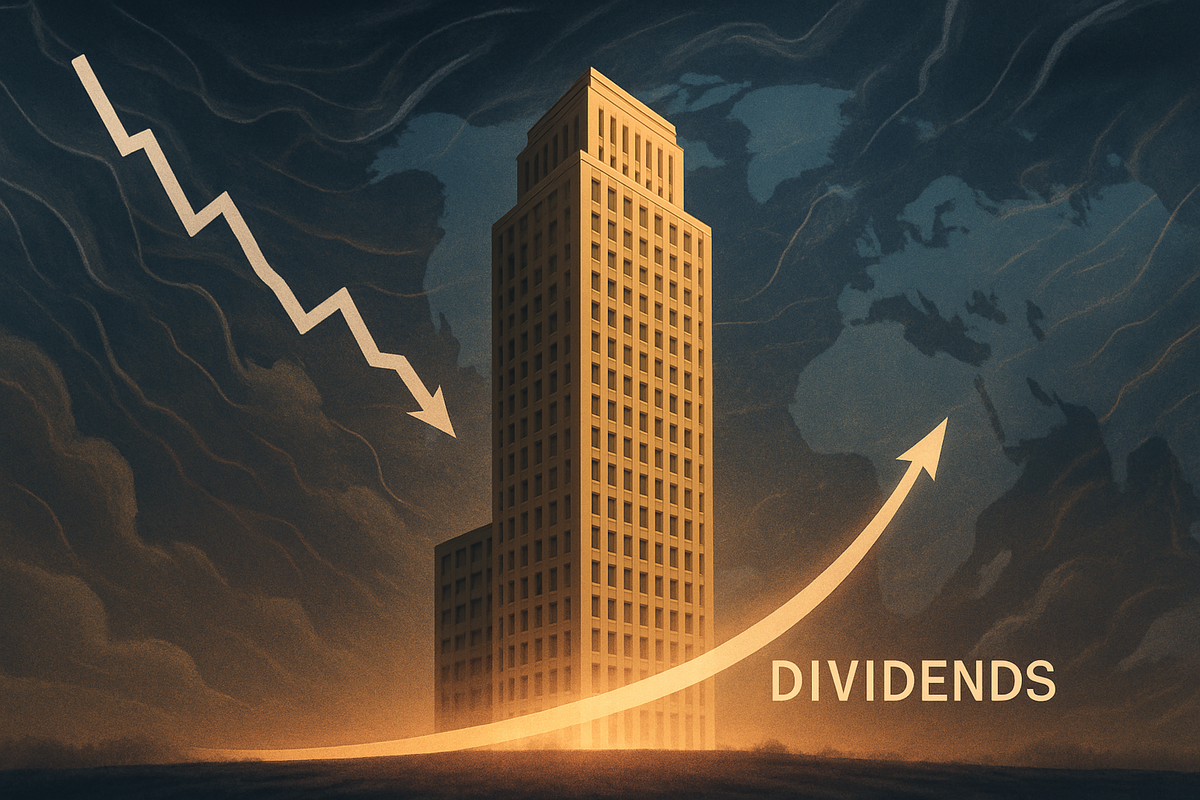Financial News
MetLife Stands Firm: Consistent Dividends Offer Investors a Beacon of Stability Amidst Global Market Headwinds

In an era defined by unpredictable global market fluctuations and economic uncertainties, the steadfast commitment of global companies to consistent dividend payouts has emerged as a critical indicator of corporate resilience and a significant draw for investors seeking stability. A prime example of this trend is MetLife (NYSE: MET), a financial services giant that has maintained a robust dividend payout despite navigating various market challenges. This unwavering approach to shareholder returns not only highlights MetLife's inherent financial strength but also underscores a broader shift in investor sentiment towards income-generating assets during periods of heightened volatility.
The appeal of dividend-paying stocks intensifies when global markets are in turmoil. Investors, often wary of capital depreciation in uncertain times, gravitate towards companies that reliably distribute a portion of their earnings. These dividends act as a tangible return on investment, providing a crucial income stream that can offset potential losses from stock price fluctuations. MetLife's consistent dividend, even through economic downturns like the 2008 financial crisis and the 2020 pandemic, serves as a testament to its disciplined financial management and robust business model, offering a sense of security to its shareholders.
MetLife's Dividend Resilience in Detail
MetLife's commitment to its dividend policy is deeply rooted in its financial strategy and operational strength. The company recently announced a quarterly dividend of $0.5675 per share, maintaining a consistent payout that extends a 12-year history of dividend growth. This stability is not accidental; it's a direct result of MetLife's robust balance sheet, which boasted $5.2 billion in holding company cash and liquid assets as of Q2 2025. This strong liquidity position ensures that the company has ample resources to cover its dividend obligations, even in adverse market conditions.
The company's dividend payments are also well-covered by its earnings, with a conservative payout ratio generally ranging from 39.96% to 55.49%. This healthy ratio indicates that MetLife is not overextending itself to pay dividends, leaving sufficient capital for reinvestment in the business, debt reduction, and strategic acquisitions. This financial prudence is a key factor in its ability to sustain and grow its dividends over the long term. Furthermore, MetLife's global diversification across Asia, Latin America, Europe, the Middle East, and Africa provides a significant buffer against regional economic shocks. This broad geographic footprint allows the company to mitigate risks and maintain stable performance, even when specific markets face headwinds.
Initial market reactions to MetLife's consistent dividend policy have been largely positive, reinforcing investor confidence in the company's long-term value proposition. The continued return of capital to shareholders, including through share repurchases and dividends totaling $900 million in the first half of 2025, signals management's confidence in the company's future earnings power and its commitment to shareholder value. Key stakeholders, including institutional investors and individual income-focused investors, view MetLife's dividend stability as a compelling reason to hold or increase their positions, especially when alternative investment options offer less certainty.
Market Implications: Winners and Losers
The consistent dividend payout from companies like MetLife has significant implications for various market participants. Income-focused investors (individuals and institutions seeking regular income from their investments) are clear winners. They benefit from a predictable cash flow that can be crucial for retirement planning, living expenses, or reinvestment. During periods of low interest rates or volatile equity markets, the stable yield from dividend stocks becomes even more attractive, providing a reliable source of return that can offset potential losses from stock price fluctuations.
Companies with strong balance sheets and consistent cash flow are also positioned to win in this environment. MetLife (NYSE: MET), for instance, reinforces its reputation as a financially sound and reliable investment. This can lead to increased investor demand, potentially boosting its stock price and lowering its cost of capital. Other global companies that demonstrate similar dividend stability, particularly those in mature industries with predictable earnings, are likely to see similar positive investor sentiment. This trend might encourage other firms to prioritize dividend consistency as a way to attract and retain investors, especially if they operate in sectors prone to cyclical downturns.
Conversely, growth-oriented companies that prioritize reinvestment over dividends might find themselves at a disadvantage in a market increasingly valuing stability. While these companies often offer higher capital appreciation potential, their lack of a consistent dividend can make them less appealing to risk-averse investors during uncertain times. Similarly, companies with weak financials or inconsistent earnings that are forced to cut or suspend their dividends will likely face negative market reactions. This can lead to a decline in stock price, reduced investor confidence, and a higher cost of capital, making it more challenging to raise funds or pursue growth initiatives. The broader financial services sector, particularly those with a history of consistent payouts, may see increased interest from investors seeking similar stability.
Wider Significance and Broader Trends
MetLife's dividend stability is not an isolated event but rather fits into a broader industry trend where corporate resilience and shareholder returns are increasingly intertwined, especially in the face of global economic uncertainties. This phenomenon highlights a fundamental shift in investor priorities, moving from aggressive growth at any cost to a more balanced approach that values sustainable income and capital preservation. The consistent payouts from established global players like MetLife underscore the importance of robust financial health, prudent risk management, and a diversified business model in navigating turbulent times.
This trend has potential ripple effects across various sectors. Competitors within the insurance and financial services industries, such as Prudential Financial (NYSE: PRU) or Aflac (NYSE: AFL), might feel pressure to demonstrate similar dividend stability to remain competitive for investor capital. Companies that consistently deliver on their dividend promises can gain a competitive edge, attracting a loyal base of income-seeking investors. Furthermore, this emphasis on dividend stability could influence corporate governance, encouraging boards to prioritize sustainable earnings and conservative financial policies that support long-term shareholder value.
From a regulatory standpoint, the focus on dividend stability could indirectly promote greater financial transparency and stricter capital requirements. Regulators might view consistent dividend payouts as an indicator of a company's underlying health, potentially influencing their approach to oversight and stress testing. Historically, during periods of economic recession or market downturns, dividend-paying stocks have often outperformed non-dividend payers, offering a cushion against market declines. This historical precedent reinforces the current investor preference for stability, drawing parallels to past crises where reliable income streams proved invaluable. The current environment, marked by geopolitical tensions, inflationary pressures, and supply chain disruptions, further amplifies the appeal of companies that can weather these storms and continue to reward shareholders.
What Comes Next: Navigating the Future
Looking ahead, the emphasis on dividend stability from global companies like MetLife is likely to continue shaping investment strategies and corporate behavior in both the short and long term. In the immediate future, we can expect a sustained demand for dividend-paying stocks, particularly from institutional investors and retirees who rely on consistent income. This could lead to a premium being placed on companies with strong dividend track records, potentially influencing their valuations and attracting further capital inflows.
From a corporate perspective, the trend may prompt a strategic pivot for some companies. Those that have historically focused solely on growth might begin to re-evaluate their capital allocation strategies, considering the introduction or increase of dividends to broaden their investor appeal. This could involve a greater focus on generating stable cash flows, optimizing operational efficiency, and maintaining healthy balance sheets. For companies already paying dividends, the pressure will be on to demonstrate continued stability and, where possible, gradual growth, to retain investor confidence.
Market opportunities may emerge for new financial products and funds that specifically target dividend-paying stocks or strategies focused on income generation. Conversely, challenges may arise for companies operating in highly cyclical industries or those with significant debt burdens, as their ability to maintain consistent dividends could be compromised during economic downturns. Potential scenarios include a widening divergence between the performance of dividend-paying and non-dividend-paying stocks, with the former showing greater resilience in volatile markets. Investors should also watch for any shifts in central bank policies, as interest rate changes can influence the relative attractiveness of dividend stocks compared to fixed-income investments. The long-term outcome could be a more disciplined corporate landscape, where financial prudence and consistent shareholder returns are valued alongside growth potential.
Comprehensive Wrap-Up: A New Era of Investment Prioritization
In summary, MetLife's unwavering commitment to dividend stability amidst global market challenges serves as a powerful illustration of a significant shift in investor sentiment and corporate strategy. The key takeaway is that in an increasingly uncertain world, the predictable income stream provided by consistent dividend payouts has become a paramount factor for many investors. This trend highlights the enduring value of corporate resilience, robust financial health, and disciplined capital management.
Moving forward, the market is likely to continue prioritizing companies that demonstrate a strong capacity for generating stable earnings and returning capital to shareholders. Investors should carefully assess a company's dividend history, payout ratio, and underlying financial strength before making investment decisions. The ability of global companies to maintain and grow their dividends, even in the face of economic headwinds, will be a crucial indicator of their long-term viability and attractiveness.
What investors should watch for in the coming months includes continued corporate earnings reports to gauge dividend coverage, any announcements regarding dividend policy changes, and broader economic indicators that could impact corporate profitability and cash flow. The stability offered by dividend-paying stocks, exemplified by MetLife, is not merely a short-term phenomenon but rather a reflection of a maturing investment landscape where sustainable income and capital preservation are becoming increasingly valued. This era signals a potential rebalancing of investment priorities, where the steady hand of a dividend-paying giant can provide a much-needed anchor in turbulent financial waters.
This content is intended for informational purposes only and is not financial advice
More News
View More




Recent Quotes
View More
Quotes delayed at least 20 minutes.
By accessing this page, you agree to the Privacy Policy and Terms Of Service.



